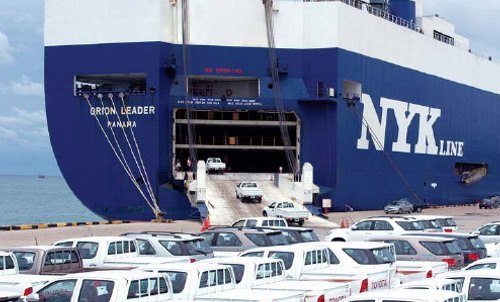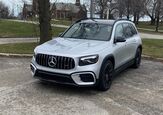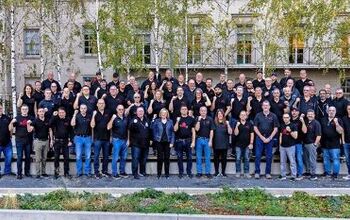America's Hot Export Article: "Import" Cars

Many people don’t realize that most of the “import” cars bought and sold in America no longer roll off a boat, but off an assembly line somewhere in the American heartland. Or at least in the North American heartland. It comes as an even bigger surprise that these cars are one of America’s most successful export products, going from American ports to many countries in the world – where people often are likewise ignorant of the car’s American origin.
Yesterday, we were surprised by the news that Honda aims to become a net exporter from North America in two years. Numbed by the PSTD of too much moronic electioneering, we often forget that “the American Auto Industry” also consists of names like Hyundai, Volkswagen, or Toyota. “Foreign” automakers employ more than an third of America’s autoworkers, who build more than a third of the Made in America cars.
What is very little known is that for many years, these foreign companies have been exporting an increasing number of the American-made cars. While bailed-out GM is busy creating jobs in China (this year alone, GM built some 2.6 million cars in China, vs. 1.9 million in the U.S.) foreign automakers do more to build export-based auto jobs in the US than the companies rescued in the bailout.
- BMW exported 70 percent of the 276,000 cars it built 2011in Spartanburg, SC, helping South Carolina overtake Michigan as the No. 1 exporter of automobiles. BMW X3, X5, and X6 go from Spartanburg to 130 countries.
- Mercedes-Benz exports half of its cars made at its Birmingham, Ala. plant to countries outside NAFTA.
- Honda started exporting U.S. made Hondas 25 years ago. On Wednesday, the 1 millionth Honda automobile to be exported from the U.S. rolled off the line at the company’s Marysville Auto Plant. The 2013 Honda Accord EX-L Sedan is on its 8,000 mile way to South Korea. Since 1987, Honda has exported more than $22 billion worth of automobiles and components from the U.S. American Honda exports the Accord, CR-V, Civic, Odyssey, Pilot from its factories in the U.S.
- At Nissan, “the numbers are trending toward Nissan being a net exporter,” a spokesman in Yokohama said. In 2012, Nissan exported 247,779 units from NAFTA, imported 418,248 and built 1,157,612 in the region, for a net import balance of 170,469 units. “The tipping point comes when we localize production of the next-generation Nissan Rogue in the U.S. at the end of 2013,” the spokesman said. Nissan is on pace to sell more than 140K Rogues in the U.S. this year. Once they are built stateside, they will reduce Nissan’s import number to less than 300,000, and with increased exports, Nissan could become a net exporter from North America in 2014. Nissan exports the Altima, Frontier, Maxima, Pathfinder, and X-Terra from its factories in the U.S.
- Toyota began exporting U.S.-assembled vehicles in 1988, and now exports U.S.-assembled vehicles to 21 countries around the world. These exports are expected to increase in calendar year 2012 to more than 130,000 units – a 52% increase from last year and an all-time high for Toyota. The company began exporting Indiana-assembled Sienna minivans and Kentucky-assembled Camry sedans to South Korea last year. Other exports include the Kentucky-produced Avalon sedan, the Indiana-produced Highlander and Sequoia SUVs and the Texas-produced Tacoma and Tundra pick-up trucks. In November, Toyota announced the export of U.S.-assembled Venza crossovers to its distributor in South Korea.
- Subaru exports the Legacy, Outback, and Tribeca from its factories in the U.S.
17 percent of the cars made at Japanese plants in the U.S. were exported in 2011 for a total of 259,908 units. This total is expected to increase drastically in 2012 and in the coming years.
Free trade agreements are a main driver behind these exports. Free trade agreements get rid of a small 2.5 percent tariff on auto imports to the U.S., but they also eliminate often much higher tariffs on auto imports to other countries. This, a low dollar, and volume production in the U.S. make a strong business case for exports from America. A free trade agreement between American and South Korea made transport of “Japanese” cars from America to Korea more attractive than shipping them the much shorter way from Japan.

Bertel Schmitt comes back to journalism after taking a 35 year break in advertising and marketing. He ran and owned advertising agencies in Duesseldorf, Germany, and New York City. Volkswagen A.G. was Bertel's most important corporate account. Schmitt's advertising and marketing career touched many corners of the industry with a special focus on automotive products and services. Since 2004, he lives in Japan and China with his wife <a href="http://www.tomokoandbertel.com"> Tomoko </a>. Bertel Schmitt is a founding board member of the <a href="http://www.offshoresuperseries.com"> Offshore Super Series </a>, an American offshore powerboat racing organization. He is co-owner of the racing team Typhoon.
More by Bertel Schmitt
Latest Car Reviews
Read moreLatest Product Reviews
Read moreRecent Comments
- Michael Gallagher I agree to a certain extent but I go back to the car SUV transition. People began to buy SUVs because they were supposedly safer because of their larger size when pitted against a regular car. As more SUVs crowded the road that safety advantage began to dwindle as it became more likely to hit an equally sized SUV. Now there is no safety advantage at all.
- Probert The new EV9 is even bigger - a true monument of a personal transportation device. Not my thing, but credit where credit is due - impressive. The interior is bigger than my house and much nicer with 2 rows of lounge seats and 3rd for the plebes. 0-60 in 4.5 seconds, around 300miles of range, and an e-mpg of 80 (90 for the 2wd). What a world.
- Ajla "Like showroom" is a lame description but he seems negotiable on the price and at least from what the two pictures show I've dealt with worse. But, I'm not interested in something with the Devil's configuration.
- Tassos Jong-iL I really like the C-Class, it reminds me of some trips to Russia to visit Dear Friend VladdyPoo.
- ToolGuy New Hampshire


































Comments
Join the conversation
A couple of things. 1. For those who sing aria about highly skilled German craftsmen; don't a lot of Turks work the assembly lines in Germany? 2. Maybe I have some idiot savant streak but I remember Subaru mentioning their plant in Lafayette, In; Honda, their Marysville, OH plant, Toyota their Georgetown, KY plant and even vaunted BMW their Spartanburg, SC plant. Nissan came with a window sticker saying they were built in Tennessee.
Tresmonos, I think a large part of the reason Germans don't do or didn't do the quality control was that they trusted their workers. In fact much more than that I think a German worker would be insulted if they told him that the company needed to create a whole new department to make sure whatever they produced was at least of passable quality never mind exceptional quality. As German factories employ more and more foreign workers they learn the hard way that they need the quality control now because foreign workers are not German workers by and large. As far as I am concerned North American labor is far inferior to advanced European countries no matter how many schools they may have. They only work to make a living, in Europe the craftsmen work to produce valuable artifacts, for many it's the purpose of their life. The only thing I hear from North America workers is how much benefits they get and how to not work yet still collect full salary and benefits. What school is ever going to change that attitude?